Zero2Auto custom sample analysis
A detailed report about the custom sample from the online “Zero2Auto” course, with my solution to automating the unpacking of the first stage of the malware, extracting the configuration from it, and then downloading the final paylod. Then lastly decrypt the final payload.
Short summary report for the IR Team
The suspicous sample the IR team found on an infected machine has the following functionality:
Spawns and injects itself into svhost.exe processes to try and hide it's presence on the system.
Acts like a downloader for additional malicous code.
Uses legitimate webservices like Pastebin to get the next download stage to stay under the radar.
Hides additional downloaded payloads in .PNG files, possibly to bypass FW/EDR/AV solutions.
The final stage of the malicous code indicates the infected client has been "Uh Oh Hacked".
I've attached the following Yara rule to this email,
that can help the IR team to find client(s) infected with this malware.
rule Zero_2_Auto_CruLoader
{
meta:
author="daevlin"
description="Zero2Auto CruLoader"
reference="https://courses.zero2auto.com/"
strings:
$cruloader_pdb = "Cruloader_Payload.pdb" wide ascii
$cruloader_string = "cruloader" wide ascii
condition:
($cruloader_pdb or $cruloader_string)
}
Host based IOCs:
Any svhost.exe processes with the wrong PPID which have been started without the -k switch
The existance of the folder %TEMP%\\cruloader" with the file "output.jpg"
Network based IOC:s
https://pastebin.com/raw/mLem9DGk
https://i.ibb.co/KsfqHym/PNG-02-Copy.png
Browser User-Agent: cruloader
Detailed analysis of the custom malware sample
Tools used: “rabin2, rahex2, Resource Hacker, DiE, Cutter, x32dbg, Python, Inetsim, PE-Bear”
We start by getting a hash of the file.
Sample SHA256: a0ac02a1e6c908b90173e86c3e321f2bab082ed45236503a21eb7d984de10611 main_bin.exe
The file is compiled Sun Jun 21 16:12:38 2020. There seems to be no indication of time stomping of the file.
Looking at the hash on VT we can see that we get some hits when looking for the file hash:
Scanned on : 2020-06-21 14:15:51
Detections: 24/72 Positives/Total
Results for MD5 : a84e1256111e4e235250a8e3bb11f903
Results for SHA1 : 1b76e5a645a0df61bb4569d54bd1183ab451c95e
Results for SHA256 : a0ac02a1e6c908b90173e86c3e321f2bab082ed45236503a21eb7d984de10611
Permanent Link : https://www.virustotal.com/gui/file/a0ac02a1e6c908b90173e86c3e321f2bab082ed45236503a21eb7d984de10611/detection/f-a0ac02a1e6c908b90173e86c3e321f2bab082ed45236503a21eb7d984de10611-1592748951
This may be a indicator that the sample is malicous.
Looking at the imports with the command “rabin2 -i main_bin.exe” we can see that the sample imports the following API functions:
[Imports]
ordinal=001 plt=0x00000000 bind=NONE type=FUNC name=KERNEL32.dll_GetModuleFileNameA
ordinal=002 plt=0x00000000 bind=NONE type=FUNC name=KERNEL32.dll_LoadLibraryA
ordinal=003 plt=0x00000000 bind=NONE type=FUNC name=KERNEL32.dll_GetProcAddress
ordinal=004 plt=0x00000000 bind=NONE type=FUNC name=KERNEL32.dll_WriteConsoleW
ordinal=005 plt=0x00000000 bind=NONE type=FUNC name=KERNEL32.dll_UnhandledExceptionFilter
ordinal=006 plt=0x00000000 bind=NONE type=FUNC name=KERNEL32.dll_SetUnhandledExceptionFilter
ordinal=007 plt=0x00000000 bind=NONE type=FUNC name=KERNEL32.dll_GetCurrentProcess
ordinal=008 plt=0x00000000 bind=NONE type=FUNC name=KERNEL32.dll_TerminateProcess
ordinal=009 plt=0x00000000 bind=NONE type=FUNC name=KERNEL32.dll_IsProcessorFeaturePresent
ordinal=010 plt=0x00000000 bind=NONE type=FUNC name=KERNEL32.dll_QueryPerformanceCounter
ordinal=011 plt=0x00000000 bind=NONE type=FUNC name=KERNEL32.dll_GetCurrentProcessId
ordinal=012 plt=0x00000000 bind=NONE type=FUNC name=KERNEL32.dll_GetCurrentThreadId
ordinal=013 plt=0x00000000 bind=NONE type=FUNC name=KERNEL32.dll_GetSystemTimeAsFileTime
ordinal=014 plt=0x00000000 bind=NONE type=FUNC name=KERNEL32.dll_InitializeSListHead
ordinal=015 plt=0x00000000 bind=NONE type=FUNC name=KERNEL32.dll_IsDebuggerPresent
ordinal=016 plt=0x00000000 bind=NONE type=FUNC name=KERNEL32.dll_GetStartupInfoW
ordinal=017 plt=0x00000000 bind=NONE type=FUNC name=KERNEL32.dll_GetModuleHandleW
ordinal=018 plt=0x00000000 bind=NONE type=FUNC name=KERNEL32.dll_RtlUnwind
ordinal=019 plt=0x00000000 bind=NONE type=FUNC name=KERNEL32.dll_GetLastError
ordinal=020 plt=0x00000000 bind=NONE type=FUNC name=KERNEL32.dll_SetLastError
ordinal=021 plt=0x00000000 bind=NONE type=FUNC name=KERNEL32.dll_EnterCriticalSection
ordinal=022 plt=0x00000000 bind=NONE type=FUNC name=KERNEL32.dll_LeaveCriticalSection
ordinal=023 plt=0x00000000 bind=NONE type=FUNC name=KERNEL32.dll_DeleteCriticalSection
ordinal=024 plt=0x00000000 bind=NONE type=FUNC name=KERNEL32.dll_InitializeCriticalSectionAndSpinCount
ordinal=025 plt=0x00000000 bind=NONE type=FUNC name=KERNEL32.dll_TlsAlloc
ordinal=026 plt=0x00000000 bind=NONE type=FUNC name=KERNEL32.dll_TlsGetValue
ordinal=027 plt=0x00000000 bind=NONE type=FUNC name=KERNEL32.dll_TlsSetValue
ordinal=028 plt=0x00000000 bind=NONE type=FUNC name=KERNEL32.dll_TlsFree
ordinal=029 plt=0x00000000 bind=NONE type=FUNC name=KERNEL32.dll_FreeLibrary
ordinal=030 plt=0x00000000 bind=NONE type=FUNC name=KERNEL32.dll_LoadLibraryExW
ordinal=031 plt=0x00000000 bind=NONE type=FUNC name=KERNEL32.dll_RaiseException
ordinal=032 plt=0x00000000 bind=NONE type=FUNC name=KERNEL32.dll_GetStdHandle
ordinal=033 plt=0x00000000 bind=NONE type=FUNC name=KERNEL32.dll_WriteFile
ordinal=034 plt=0x00000000 bind=NONE type=FUNC name=KERNEL32.dll_GetModuleFileNameW
ordinal=035 plt=0x00000000 bind=NONE type=FUNC name=KERNEL32.dll_ExitProcess
ordinal=036 plt=0x00000000 bind=NONE type=FUNC name=KERNEL32.dll_GetModuleHandleExW
ordinal=037 plt=0x00000000 bind=NONE type=FUNC name=KERNEL32.dll_GetCommandLineA
ordinal=038 plt=0x00000000 bind=NONE type=FUNC name=KERNEL32.dll_GetCommandLineW
ordinal=039 plt=0x00000000 bind=NONE type=FUNC name=KERNEL32.dll_HeapAlloc
ordinal=040 plt=0x00000000 bind=NONE type=FUNC name=KERNEL32.dll_HeapFree
ordinal=041 plt=0x00000000 bind=NONE type=FUNC name=KERNEL32.dll_FindClose
ordinal=042 plt=0x00000000 bind=NONE type=FUNC name=KERNEL32.dll_FindFirstFileExW
ordinal=043 plt=0x00000000 bind=NONE type=FUNC name=KERNEL32.dll_FindNextFileW
ordinal=044 plt=0x00000000 bind=NONE type=FUNC name=KERNEL32.dll_IsValidCodePage
ordinal=045 plt=0x00000000 bind=NONE type=FUNC name=KERNEL32.dll_GetACP
ordinal=046 plt=0x00000000 bind=NONE type=FUNC name=KERNEL32.dll_GetOEMCP
ordinal=047 plt=0x00000000 bind=NONE type=FUNC name=KERNEL32.dll_GetCPInfo
ordinal=048 plt=0x00000000 bind=NONE type=FUNC name=KERNEL32.dll_MultiByteToWideChar
ordinal=049 plt=0x00000000 bind=NONE type=FUNC name=KERNEL32.dll_WideCharToMultiByte
ordinal=050 plt=0x00000000 bind=NONE type=FUNC name=KERNEL32.dll_GetEnvironmentStringsW
ordinal=051 plt=0x00000000 bind=NONE type=FUNC name=KERNEL32.dll_FreeEnvironmentStringsW
ordinal=052 plt=0x00000000 bind=NONE type=FUNC name=KERNEL32.dll_SetEnvironmentVariableW
ordinal=053 plt=0x00000000 bind=NONE type=FUNC name=KERNEL32.dll_SetStdHandle
ordinal=054 plt=0x00000000 bind=NONE type=FUNC name=KERNEL32.dll_GetFileType
ordinal=055 plt=0x00000000 bind=NONE type=FUNC name=KERNEL32.dll_GetStringTypeW
ordinal=056 plt=0x00000000 bind=NONE type=FUNC name=KERNEL32.dll_CompareStringW
ordinal=057 plt=0x00000000 bind=NONE type=FUNC name=KERNEL32.dll_LCMapStringW
ordinal=058 plt=0x00000000 bind=NONE type=FUNC name=KERNEL32.dll_GetProcessHeap
ordinal=059 plt=0x00000000 bind=NONE type=FUNC name=KERNEL32.dll_HeapSize
ordinal=060 plt=0x00000000 bind=NONE type=FUNC name=KERNEL32.dll_HeapReAlloc
ordinal=061 plt=0x00000000 bind=NONE type=FUNC name=KERNEL32.dll_FlushFileBuffers
ordinal=062 plt=0x00000000 bind=NONE type=FUNC name=KERNEL32.dll_GetConsoleOutputCP
ordinal=063 plt=0x00000000 bind=NONE type=FUNC name=KERNEL32.dll_GetConsoleMode
ordinal=064 plt=0x00000000 bind=NONE type=FUNC name=KERNEL32.dll_SetFilePointerEx
ordinal=065 plt=0x00000000 bind=NONE type=FUNC name=KERNEL32.dll_CreateFileW
ordinal=066 plt=0x00000000 bind=NONE type=FUNC name=KERNEL32.dll_CloseHandle
ordinal=067 plt=0x00000000 bind=NONE type=FUNC name=KERNEL32.dll_DecodePointer
Looking at the sections of the binary with the following command “rabin2 -S main_bin.exe” show this:
[Sections]
idx=00 addr=0x00000400 off=0x00000400 sz=50688 vsz=50335 perm=-r-x name=.text
idx=01 addr=0x0000ca00 off=0x0000ca00 sz=23040 vsz=23002 perm=-r-- name=.rdata
idx=02 addr=0x00012400 off=0x00012400 sz=2560 vsz=5028 perm=-rw- name=.data
idx=03 addr=0x00012e00 off=0x00012e00 sz=87552 vsz=87168 perm=-r-- name=.rsrc
idx=04 addr=0x00028400 off=0x00028400 sz=4096 vsz=3768 perm=-r-- name=.reloc
What sticks out in this case is that the .rsrc section is quite big, but there are no calls to any API functions to access it, for example:
SizeofResource
FindResourceA
LockResource
LoadResource
The program DiE does not indicate that the sample is packed with a known packer. But hiding API calls and the big .rsrc section makes me have a theory that it is. I just have to prove it somehow.
diec main_bin.exe
PE: compiler: Microsoft Visual C/C++(-)[-]
PE: linker: Microsoft Linker(14.25)[EXE32,console]
Looking at the file in “Resource Hacker”. There is a “RT_RCDATA” resource with ID “101”. The .rsrc is kind of big, 86 KB to be exact and seems to contains random bytes, which may indicate it’s packed or encrypted/obfuscated.
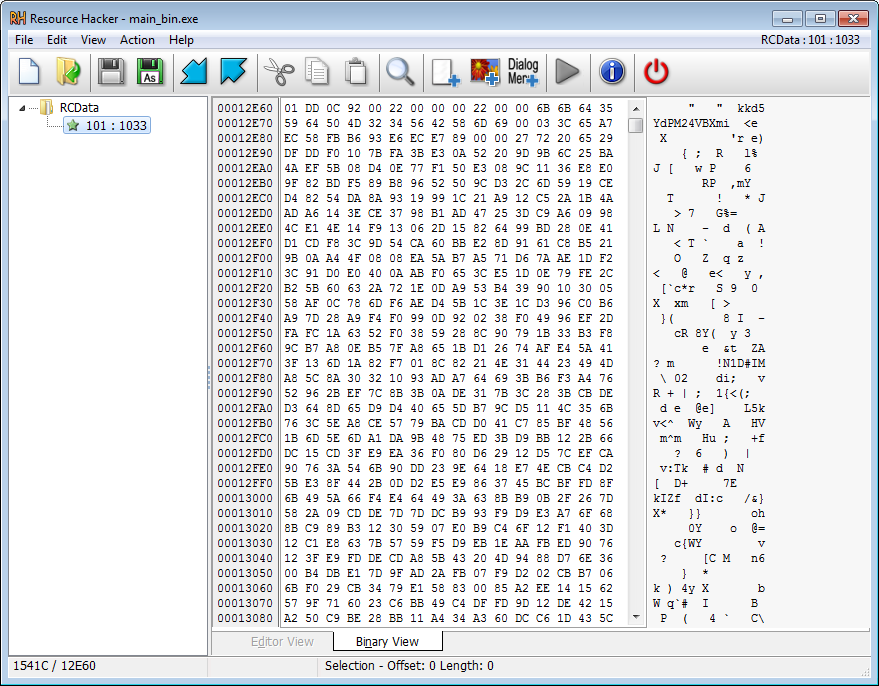
The .rsrc section also has quite a high entropy, as shown by the diagram in DiE. The high entropy strenghtens our theory about it being packed or encrypted/obfuscated.
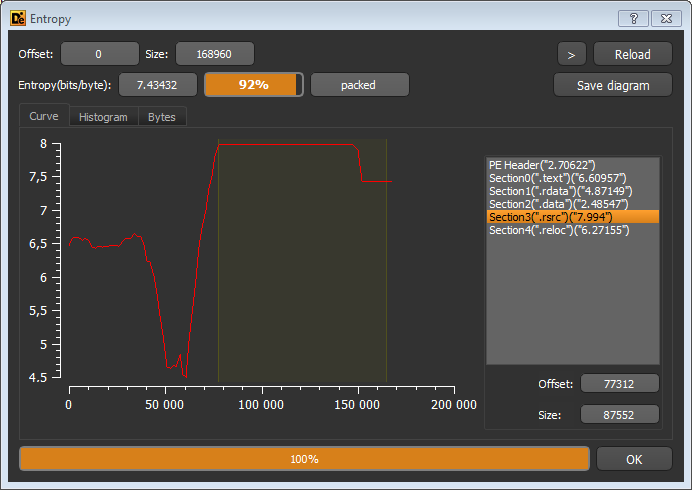
Let’s do some analysis of the suspicous binary in Cutter. What immediatly peaks my interest, is what looks like a lookup table in the Strings pane in Cutter. “abcdefghijklmnopqrstuvwxyzABCDEFGHIJKLMNOPQRSTUVWXYZ01234567890./=”
Looking a xrefs to the string we come to this function:
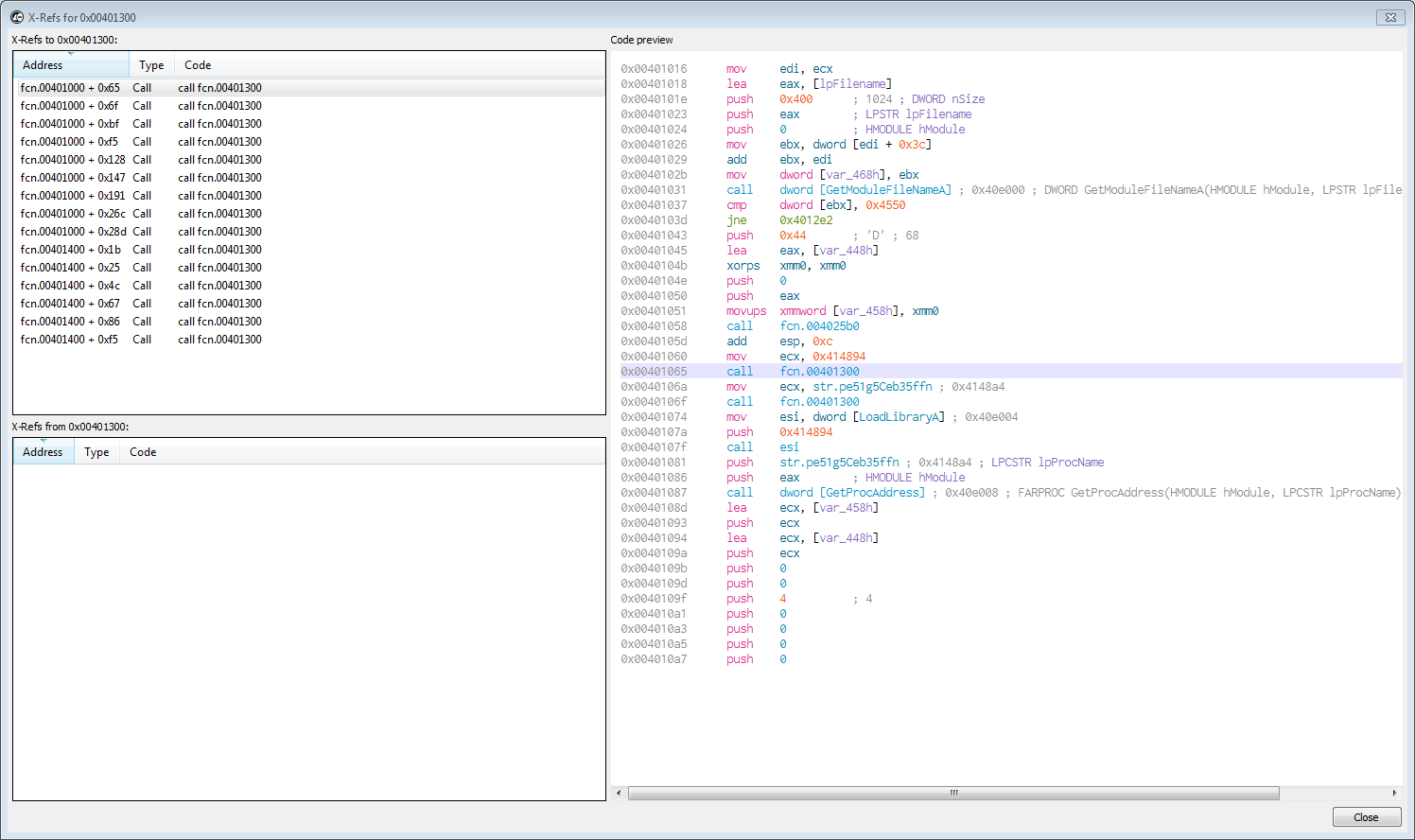
The decompiled function looks like this as pseudo code in Cutter.
void __fastcall fcn.00401300(char *param_1)
{
char cVar1;
char cVar2;
int32_t iVar3;
int32_t *piVar4;
char *pcVar5;
int32_t iVar6;
int32_t iVar7;
int32_t var_4ch;
int32_t var_48h;
int32_t var_38h;
int32_t var_28h;
int32_t var_18h;
int32_t var_8h;
int32_t var_4h;
iVar7 = 0;
pcVar5 = param_1;
do {
cVar1 = *pcVar5;
pcVar5 = pcVar5 + 1;
} while (cVar1 != '\0');
if (pcVar5 != param_1 + 1 && -1 < (int32_t)(pcVar5 + -(int32_t)(param_1 + 1))) {
do {
cVar1 = param_1[iVar7];
var_48h = "abcdefghijklmnopqrstuvwxyzABCDEFGHIJKLMNOPQRSTUVWXYZ01234567890./="._0_4_;
cVar2 = fcn.004038f4(1);
iVar3 = fcn.00402190(&var_48h, (int32_t)cVar1);
if (iVar3 != 0) {
piVar4 = &var_48h;
iVar3 = iVar3 - (int32_t)piVar4;
do {
cVar1 = *(char *)piVar4;
piVar4 = (int32_t *)((int32_t)piVar4 + 1);
} while (cVar1 != '\0');
piVar4 = (int32_t *)((int32_t)piVar4 - ((int32_t)&var_48h + 1));
iVar6 = iVar3 + 0xd;
if ((int32_t)piVar4 <= iVar6) {
iVar6 = (iVar3 - (int32_t)piVar4) + 0xd;
}
cVar2 = *(char *)((int32_t)&var_48h + iVar6);
}
param_1[iVar7] = cVar2;
iVar7 = iVar7 + 1;
pcVar5 = param_1;
do {
cVar1 = *pcVar5;
pcVar5 = pcVar5 + 1;
} while (cVar1 != '\0');
} while (iVar7 < (int32_t)(pcVar5 + -(int32_t)(param_1 + 1)));
}
fcn.0040163b((int32_t)param_1);
return;
}
Before each call to GetProcAddress the fcn.00401300 is called. Let’s assume that fcn.00401300 is our decryption function for now.
void __fastcall fcn.00401000(int32_t param_1)
{
undefined4 uVar1;
code *pcVar2;
int32_t iVar3;
undefined4 *puVar4;
code *pcVar5;
code *pcVar6;
int32_t iVar7;
int32_t *piVar8;
int32_t iVar9;
int32_t iVar10;
int32_t unaff_EDI;
int32_t var_470h;
undefined4 var_46ch;
int32_t var_468h;
undefined4 var_464h;
undefined4 var_460h;
int32_t var_45ch;
int32_t var_458h;
int32_t var_454h;
int32_t var_448h;
undefined4 lpFilename;
int32_t var_4h;
piVar8 = (int32_t *)(*(int32_t *)(param_1 + 0x3c) + param_1);
(*_GetModuleFileNameA)(0, &lpFilename, 0x400);
if (*piVar8 == 0x4550) {
_var_458h = ZEXT816(0);
fcn.004025b0(&var_448h, 0, 0x44);
fcn.00401300();
fcn.00401300();
pcVar5 = _LoadLibraryA;
uVar1 = (*_LoadLibraryA)(0x414894);
pcVar2 = (code *)(*_GetProcAddress)(uVar1, "pe51g5Ceb35ffn");
iVar3 = (*pcVar2)(&lpFilename, 0, 0, 0, 0, 4, 0, 0, &var_448h, &var_458h);
if (iVar3 != 0) {
fcn.00401300();
uVar1 = (*pcVar5)(0x414894);
pcVar2 = (code *)(*_GetProcAddress)(uVar1, 0x4148e8);
puVar4 = (undefined4 *)(*pcVar2)(0, 4, 0x1000, 4);
*puVar4 = 0x10007;
fcn.00401300();
uVar1 = (*pcVar5)(0x414894);
pcVar2 = (code *)(*_GetProcAddress)(uVar1, "t5gG8e514pbag5kg");
iVar3 = (*pcVar2)(var_454h, puVar4);
if (iVar3 != 0) {
fcn.00401300();
uVar1 = (*pcVar5)(0x414894);
pcVar5 = (code *)(*_GetProcAddress)(uVar1, "E514Ceb35ffz5=bel");
fcn.00401300();
uVar1 = (*_LoadLibraryA)(0x414894);
pcVar2 = (code *)(*_GetProcAddress)(uVar1, "Je9g5Ceb35ffz5=bel");
(*pcVar5)(var_458h, puVar4[0x29] + 8, &var_45ch, 4, 0);
fcn.00401300();
uVar1 = (*_LoadLibraryA)(0x414894);
pcVar5 = _GetProcAddress;
pcVar6 = (code *)(*_GetProcAddress)(uVar1, "I9egh1/n//b3rk");
iVar3 = (*pcVar6)(var_458h, piVar8[0xd], piVar8[0x14], 0x3000, 0x40);
(*pcVar2)(var_458h, iVar3, param_1, piVar8[0x15], 0);
iVar9 = 0;
if (*(int16_t *)((int32_t)piVar8 + 6) != 0) {
iVar10 = 0;
do {
iVar7 = *(int32_t *)(param_1 + 0x3c) + iVar10;
(*pcVar2)(var_458h, *(int32_t *)(iVar7 + 0x104 + param_1) + iVar3,
*(int32_t *)(iVar7 + 0x10c + param_1) + param_1,
*(undefined4 *)(iVar7 + 0x108 + param_1), 0);
iVar9 = iVar9 + 1;
iVar10 = iVar10 + 0x28;
pcVar5 = _GetProcAddress;
} while (iVar9 < (int32_t)(uint32_t)*(uint16_t *)((int32_t)piVar8 + 6));
}
(*pcVar2)(var_458h, puVar4[0x29] + 8, piVar8 + 0xd, 4, 0);
fcn.00401300();
pcVar2 = _LoadLibraryA;
uVar1 = (*_LoadLibraryA)(0x414894);
pcVar6 = (code *)(*pcVar5)(uVar1, "F5gG8e514pbag5kg");
fcn.00401300();
iVar9 = (*pcVar2)(0x414894);
pcVar5 = (code *)(*pcVar5)(iVar9, "E5fh=5G8e514");
puVar4[0x2c] = piVar8[10] + iVar3;
(*pcVar6)(var_454h, puVar4);
(*pcVar5)(var_454h);
fcn.0040163b(iVar9);
return;
}
}
}
fcn.0040163b(unaff_EDI);
return;
}
When looking at this decompiled line of code “iVar6 = iVar3 + 0xd; (0xd = 13)”, I have a sneaking suspicion that it is using ROT13 encoding. But lets fire up x32dbg and put a BP 00401300, to further analyse it and verify this theory.
Our encrypted strings:
00000000 F5gG8e514pbag5kg
00000014 .5ea5/QPY4//
00000024 pe51g5Ceb35ffn
00000034 I9egh1/n//b3rk
00000044 E5fh=5G8e514
00000054 Je9g5Ceb35ffz5=bel
00000068 I9egh1/n//b3
00000078 E514Ceb35ffz5=bel
0000008C t5gG8e514pbag5kg
000000A0 .5ea5/QPY4//
000000B0 F9m5b6E5fbhe35
000000C0 s9a4E5fbhe35n
000000D0 I9egh1/n//b3
000000E0 yb3.E5fbhe35
000000F0 yb14E5fbhe35
Let’s take a look at the first encrypted string:
.5ea5/QPY4//
Imma gonna need a quantum computer to crack this!
If we take the character “.” and rotate it 13 characters according to the lookup table (abcdefghijklmnopqrstuvwxyzABCDEFGHIJKLMNOPQRSTUVWXYZ01234567890./=) we end up on “k”. If we take the second char “5” and rotate 13, we get “e”, then “e” becomes “r” and so on and so forth.
So to summarize:
.5ea5/QPY4// becomes kernel32.dll
After the strings to get the RC4 enrypted .rsrc section are deobfuscated it will call the following API functions:
SizeofResource
FindResourceA
VirtualAlloc
LockResource
LoadResource
If we set BP on LockResource, and let it hit (and then return to user code), the address of the resource that it wants to access should be in the EAX register. It will then call VirtualAlloc to assign a memory region for the encrypted resource. After the memory region is allocated and the .rsrc section data is copied to it, we come across something that looks a lot like RC4 encryption (hint cmp eax, 100h):
iVar12 = 0;
do {
*(char *)((int32_t)&var_108h + iVar12) = (char)iVar12;
iVar12 = iVar12 + 1;
} while (iVar12 < 0x100);
uVar9 = 0;
do {
cVar1 = *(char *)((int32_t)&var_108h + uVar9);
uVar14 = uVar14 + *(char *)(uVar9 % 0xf + 0xc + iVar10) + cVar1;
*(char *)((int32_t)&var_108h + uVar9) = *(char *)((int32_t)&var_108h + (uint32_t)uVar14);
uVar9 = uVar9 + 1;
*(char *)((int32_t)&var_108h + (uint32_t)uVar14) = cVar1;
} while ((int32_t)uVar9 < 0x100);
iVar10 = 0;
if (0 < iVar2) {
do {
var_8h._0_1_ = (uint8_t)var_8h + 1;
pcVar13 = (char *)((int32_t)&var_108h + (uint32_t)(uint8_t)var_8h);
cVar1 = *pcVar13;
var_8h._1_1_ = var_8h._1_1_ + cVar1;
*pcVar13 = *(char *)((int32_t)&var_108h + (uint32_t)var_8h._1_1_);
*(char *)((int32_t)&var_108h + (uint32_t)var_8h._1_1_) = cVar1;
*(uint8_t *)(iVar10 + iVar11) =
*(uint8_t *)(iVar10 + iVar11) ^
*(uint8_t *)((int32_t)&var_108h + (uint32_t)(uint8_t)(*pcVar13 + cVar1));
iVar10 = iVar10 + 1;
} while (iVar10 < iVar2);
}
If we look at this instruction in x32dbg we can see the RC4 key that will be used for decryption:
00401592 | 0FB64438 0C | movzx eax,byte ptr ds:[eax+edi+C] | eax+edi*1+C:"kkd5YdPM24VBXmi"
EAX = 0
EDI = .rsrc section at address 00416060 + C
Size of encrypted data in hex 0x00015400 (87040 bytes)
We can validate this by starting up HxD to check for the key and the data after it.
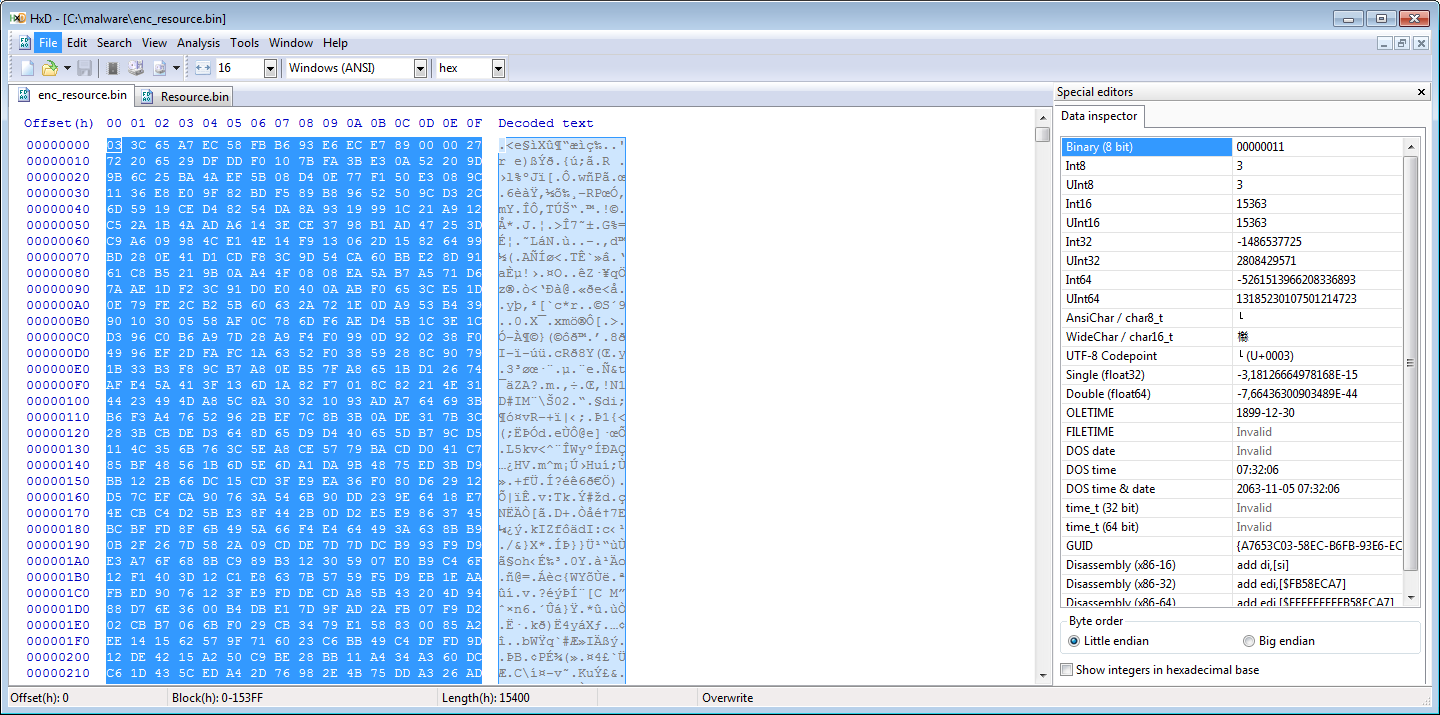
Our RC4 key is at offset C (12 bytes in).
With that knowledge, we should at least be able to make a Python script to unpack the first Stage of CruLoader. But why settle for that?
We still want to know what the additional functionality in this sample does, since we can see in the decompiled code that there are a few other encrypted strings which have not been decrypted yet.
If the let the decryption routine finish on the newly allocted memory region we can see a decrypted MZ binary, so our theory was correct.
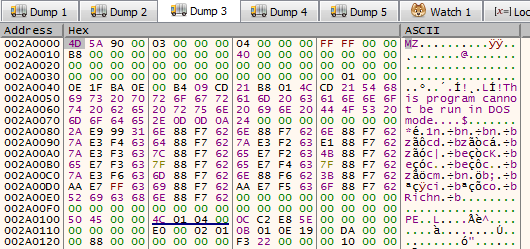
After the .rsrc has been decrypted, it goes back to resolving some more obfuscated API functions. They are the following:
00000001 SetThreadContext
00000025 CreateProcessA
00000035 VirtualAllocEx
00000045 ResumeThread
00000055 WriteProcessMemory
00000069 VirtualAlloc
00000079 ReadProcessMemory
0000008D GetThreadContext
It then calls the API function “CreateProcessA” to spawn a suspended copy of itself. This is starting to look like it will write the unpacked payload to a new child process using the API calls that were just deobfuscated.

Cruloaders second layer
So! With that knowledge, let’s move onto the next stage and look at the unpacked/decrypted payload I dumped out earlier, after it was decrypted, to see what this second stage does.
Imports of our unpacked payload does not look that suspicous. Output from the command “rabin2.exe -i unpacked_cruloader.exe”:
[Imports]
Num Vaddr Bind Type Name
1 0x0040f000 NONE FUNC KERNEL32.dll_LoadLibraryA
2 0x0040f004 NONE FUNC KERNEL32.dll_GetProcAddress
3 0x0040f008 NONE FUNC KERNEL32.dll_VirtualFree
4 0x0040f00c NONE FUNC KERNEL32.dll_VirtualAlloc
5 0x0040f010 NONE FUNC KERNEL32.dll_GetLastError
6 0x0040f014 NONE FUNC KERNEL32.dll_GetModuleHandleW
7 0x0040f018 NONE FUNC KERNEL32.dll_GetModuleFileNameA
8 0x0040f01c NONE FUNC KERNEL32.dll_lstrlenA
9 0x0040f020 NONE FUNC KERNEL32.dll_MultiByteToWideChar
10 0x0040f024 NONE FUNC KERNEL32.dll_CloseHandle
11 0x0040f028 NONE FUNC KERNEL32.dll_WriteConsoleW
12 0x0040f02c NONE FUNC KERNEL32.dll_UnhandledExceptionFilter
13 0x0040f030 NONE FUNC KERNEL32.dll_SetUnhandledExceptionFilter
14 0x0040f034 NONE FUNC KERNEL32.dll_GetCurrentProcess
15 0x0040f038 NONE FUNC KERNEL32.dll_TerminateProcess
16 0x0040f03c NONE FUNC KERNEL32.dll_IsProcessorFeaturePresent
17 0x0040f040 NONE FUNC KERNEL32.dll_QueryPerformanceCounter
18 0x0040f044 NONE FUNC KERNEL32.dll_GetCurrentProcessId
19 0x0040f048 NONE FUNC KERNEL32.dll_GetCurrentThreadId
20 0x0040f04c NONE FUNC KERNEL32.dll_GetSystemTimeAsFileTime
21 0x0040f050 NONE FUNC KERNEL32.dll_InitializeSListHead
22 0x0040f054 NONE FUNC KERNEL32.dll_IsDebuggerPresent
23 0x0040f058 NONE FUNC KERNEL32.dll_GetStartupInfoW
24 0x0040f05c NONE FUNC KERNEL32.dll_RtlUnwind
25 0x0040f060 NONE FUNC KERNEL32.dll_SetLastError
26 0x0040f064 NONE FUNC KERNEL32.dll_EnterCriticalSection
27 0x0040f068 NONE FUNC KERNEL32.dll_LeaveCriticalSection
28 0x0040f06c NONE FUNC KERNEL32.dll_DeleteCriticalSection
29 0x0040f070 NONE FUNC KERNEL32.dll_InitializeCriticalSectionAndSpinCount
30 0x0040f074 NONE FUNC KERNEL32.dll_TlsAlloc
31 0x0040f078 NONE FUNC KERNEL32.dll_TlsGetValue
32 0x0040f07c NONE FUNC KERNEL32.dll_TlsSetValue
33 0x0040f080 NONE FUNC KERNEL32.dll_TlsFree
34 0x0040f084 NONE FUNC KERNEL32.dll_FreeLibrary
35 0x0040f088 NONE FUNC KERNEL32.dll_LoadLibraryExW
36 0x0040f08c NONE FUNC KERNEL32.dll_RaiseException
37 0x0040f090 NONE FUNC KERNEL32.dll_GetStdHandle
38 0x0040f094 NONE FUNC KERNEL32.dll_WriteFile
39 0x0040f098 NONE FUNC KERNEL32.dll_GetModuleFileNameW
40 0x0040f09c NONE FUNC KERNEL32.dll_ExitProcess
41 0x0040f0a0 NONE FUNC KERNEL32.dll_GetModuleHandleExW
42 0x0040f0a4 NONE FUNC KERNEL32.dll_GetCommandLineA
43 0x0040f0a8 NONE FUNC KERNEL32.dll_GetCommandLineW
44 0x0040f0ac NONE FUNC KERNEL32.dll_HeapFree
45 0x0040f0b0 NONE FUNC KERNEL32.dll_HeapAlloc
46 0x0040f0b4 NONE FUNC KERNEL32.dll_CompareStringW
47 0x0040f0b8 NONE FUNC KERNEL32.dll_LCMapStringW
48 0x0040f0bc NONE FUNC KERNEL32.dll_GetFileType
49 0x0040f0c0 NONE FUNC KERNEL32.dll_FindClose
50 0x0040f0c4 NONE FUNC KERNEL32.dll_FindFirstFileExW
51 0x0040f0c8 NONE FUNC KERNEL32.dll_FindNextFileW
52 0x0040f0cc NONE FUNC KERNEL32.dll_IsValidCodePage
53 0x0040f0d0 NONE FUNC KERNEL32.dll_GetACP
54 0x0040f0d4 NONE FUNC KERNEL32.dll_GetOEMCP
55 0x0040f0d8 NONE FUNC KERNEL32.dll_GetCPInfo
56 0x0040f0dc NONE FUNC KERNEL32.dll_WideCharToMultiByte
57 0x0040f0e0 NONE FUNC KERNEL32.dll_GetEnvironmentStringsW
58 0x0040f0e4 NONE FUNC KERNEL32.dll_FreeEnvironmentStringsW
59 0x0040f0e8 NONE FUNC KERNEL32.dll_SetEnvironmentVariableW
60 0x0040f0ec NONE FUNC KERNEL32.dll_SetStdHandle
61 0x0040f0f0 NONE FUNC KERNEL32.dll_GetStringTypeW
62 0x0040f0f4 NONE FUNC KERNEL32.dll_GetProcessHeap
63 0x0040f0f8 NONE FUNC KERNEL32.dll_FlushFileBuffers
64 0x0040f0fc NONE FUNC KERNEL32.dll_GetConsoleOutputCP
65 0x0040f100 NONE FUNC KERNEL32.dll_GetConsoleMode
66 0x0040f104 NONE FUNC KERNEL32.dll_SetFilePointerEx
67 0x0040f108 NONE FUNC KERNEL32.dll_HeapSize
68 0x0040f10c NONE FUNC KERNEL32.dll_HeapReAlloc
69 0x0040f110 NONE FUNC KERNEL32.dll_CreateFileW
70 0x0040f114 NONE FUNC KERNEL32.dll_DecodePointer
What about the sections? Nope, there is at least not another .rsrc section.
Output from the command “rabin2.exe -S unpacked_cruloader.exe”:
[Sections]
Nm Paddr Size Vaddr Memsz Perms Name
00 0x00000400 55808 0x00401000 57344 -r-x .text
01 0x0000de00 23552 0x0040f000 24576 -r-- .rdata
02 0x00013a00 2560 0x00415000 8192 -rw- .data
03 0x00014400 4096 0x00417000 4096 -r-- .reloc
DiE is not showing high entropy for any of the sections. Looking at the strings in the binary shows something intersting though, a string “cruloader” and a .dll for which there are no API imports. Does it perhaps contain network functionality since there is a reference to wininet.dll? But where is the hostname/URL?
1062 0x00012a1c 0x00413c1c 12 13 (.rdata) ascii kernel32.dll
1063 0x00012a2c 0x00413c2c 9 10 (.rdata) ascii ntdll.dll
1064 0x00012a38 0x00413c38 11 12 (.rdata) ascii wininet.dll
Taking a quick look at it Cutter shows something suspicous. My favorite party trick, is to search for all XOR instructions. One of them sticks out a bit (there a more, but we will get to those later).
xor ecx, 0xedb88320
xor edx, 0xedb88320
Before two of the calls to GetProcAddress, this function is called. I have a sneaking suspicion that the constant “0xedb88320” is used for something important. Googling on the constant “0xedb88320” indicates that it is used for CRC32 hashing. There are 2 xrefs to this function at 0x00401660. We will look at the second use of it furher into the analysis.
uint32_t __cdecl fcn.00401660(int32_t arg_8h)
{
uint8_t uVar1;
uint32_t uVar2;
uint8_t *in_EDX;
uint32_t uVar3;
uint32_t uVar4;
uint8_t *puVar5;
if (*(int32_t *)0x41628c == 0) {
uVar4 = 0;
do {
uVar3 = uVar4 >> 1 ^ 0xedb88320;
if ((uVar4 & 1) == 0) {
uVar3 = uVar4 >> 1;
}
uVar2 = uVar3 >> 1 ^ 0xedb88320;
if ((uVar3 & 1) == 0) {
uVar2 = uVar3 >> 1;
}
uVar3 = uVar2 >> 1 ^ 0xedb88320;
if ((uVar2 & 1) == 0) {
uVar3 = uVar2 >> 1;
}
uVar2 = uVar3 >> 1 ^ 0xedb88320;
if ((uVar3 & 1) == 0) {
uVar2 = uVar3 >> 1;
}
uVar3 = uVar2 >> 1 ^ 0xedb88320;
if ((uVar2 & 1) == 0) {
uVar3 = uVar2 >> 1;
}
uVar2 = uVar3 >> 1 ^ 0xedb88320;
if ((uVar3 & 1) == 0) {
uVar2 = uVar3 >> 1;
}
uVar3 = uVar2 >> 1 ^ 0xedb88320;
if ((uVar2 & 1) == 0) {
uVar3 = uVar2 >> 1;
}
uVar2 = uVar3 >> 1 ^ 0xedb88320;
if ((uVar3 & 1) == 0) {
uVar2 = uVar3 >> 1;
}
*(uint32_t *)(uVar4 * 4 + 0x416690) = uVar2;
uVar4 = uVar4 + 1;
} while ((int32_t)uVar4 < 0x100);
*(int32_t *)0x41628c = 1;
}
uVar4 = 0xffffffff;
puVar5 = in_EDX + arg_8h;
if (in_EDX < puVar5) {
do {
uVar1 = *in_EDX;
in_EDX = in_EDX + 1;
uVar4 = uVar4 >> 8 ^ *(uint32_t *)((uVar4 & 0xff ^ (uint32_t)uVar1) * 4 + 0x416690);
} while (in_EDX < puVar5);
}
return ~uVar4;
}
Let’s validate this somehow by firing up x32dbg and correlate this with the tool “rahash2”.
x32dbg hash found:
dword ptr [ebp-C]=[0018FAE4]=8436F795
rahash2.exe -a crc32 -s "IsDebuggerPresent"
0x00000000-0x00000010 crc32: 8436f795
x32dbg hash found:
dword ptr [ebp-C]=[0018F884]=C1F3B876
rahash2.exe -a crc32 -s "CreateToolhelp32Snapshot"
0x00000000-0x00000017 crc32: c1f3b876
x32dbg hash found:
dword ptr [ebp-C]=[0018F884]=8197004C
rahash2.exe -a crc32 -s "Process32FirstW"
0x00000000-0x0000000e crc32: 8197004c
x32dbg hash found:
dword ptr [ebp-C]=[0018F884]=BC6B67BF
rahash2.exe -a crc32 -s "Process32NextW"
0x00000000-0x0000000d crc32: bc6b67bf
Whelps! What will it do with these API calls? Find a process to inject into? Be mean to us analysts and mess with us if a “forbidden” process is found? WTH? Sure enough, the process exited after it had gone through all the running processes. That’s just evil. So how do we find out which process it is looking for? It looks like it uses the CRC32 function we saw before against any running processes. If any of those matches, then the sample calls the API function “ExitProcess”. In my case I was running “Processhacker” on the system, which got detected by this function. The malware sample also seems to check for Wireshark and possibly some other running processes. Now that I have stopped ProcessHacker and restarted the debugging of the second stage, the breakpoint for CreateProcessInternalW gets hit when we run it once again and a suspended svchost.exe process gets created.
dword ptr ebp+C=0018F9F4 &"C:\\Windows\\System32\\svchost.exe"=0018FAA0 "C:\\Windows\\System32\\svchost.exe"
After the BP is hit, ProcessHacker can be started again. Why did it inject into svchost.exe? There was no strings visible with that in the second stage binary. The reason is one of the string in the second stage is obfuscated with this function:
rol dl,4
xor dl,A2 |
The string (hex)
1E 89 EF 5F BC CC 6C DC 5D 1D EF 1F BD 1D 6D 7C FC 19 09 EF 1D 4D 1C AC DC 1D 6D C8 7C AD 7C 00 86 12 40
Becomes: C:\Windows\System32\svchost.exe This explains why it got injected into “svchost.exe”
If we continue execution, it calls the API function “RemoteThread”, to create a thread in the suspended svchost.exe process at address 00101DC0 in my case, where it will continue execution in the spawned child process.
In the spawned svchost.exe process it once again uses CRC32 hashing to resolve API calls from wininet.dll.
InternetOpenA
InternetOpenUrlA
InternetReadFile
InternetCloseHandle
HttpQueryInfoA
Hmmm. API calls to internet connectivity, but we don’t see any URL/hostname in the binary. Where is it hiding? If we set a BP on InternetOpenUrlA we can see the URL “https://pastebin.com/raw/mLem9DGk”. The URL was obfuscated with:
rol dl,4
xor dl,C5
We can verify this by dragging the second stage unpacked CruLoader binary into Cyberchef and use this recipe:
Encoded URL in hex: DA 1B 1B 5B 6B FF AE AE 5B 4A 6B 1B 0A 7A CA BA BE 6A AA 8A AE 7B 4A 2B AE 8A 98 0A 8A CF 18 28 EA
Rotate_left(4,false)
XOR({'option':'Hex','string':'C5'},'Standard',false)
Extract_URLs(false)
Sidenote: When we rotate the bits left 4 steps, we essantialy change DA to AD. We could say that the string is reversed. We can validate this with malduck:
data = malduck.unhex('ae8281fca8a089a8eab2a4b7eaa8aaa6ebabaca7a0b1b6a4b5eaeaffb6b5b1b1ad')
rol4 = data[::-1]
malduck.enhex(rol4)
Returns 'adb1b1b5b6ffeaeab5a4b6b1a0a7acabeba6aaa8eab7a4b2eaa889a0a8fc8182ae'
malduck.xor(0xc5, data)
'kGD9meLm/war/moc.nibetsap//:sptth'
malduck.xor(0xc5, rol4)
'https://pastebin.com/raw/mLem9DGk'
On the Pastebin page is the following URL that gets parsed by the malware sample: https://i.ibb.co/KsfqHym/PNG-02-Copy.png
If we download the file from that URL, it is indeed a .png file that renders correctly when opened.
Let’s be sneaky and grab the .png file. We will then fire up Inetsim and let CruLoader grab the URL https://i.ibb.co/KsfqHym/PNG-02-Copy.png from the first link, https://pastebin.com/raw/mLem9DGk”, which will be hosted on our InetSim service which is acting as a webserver and a DNS. Hopefully makes it a bit easier to see if anything “fun” happens with that .png file. For this to work, since it’s calling /raw in pastebin we may have to remove all html tags from Inetsims sample.html and also change the URL to http://i.ibb.co/KsfqHym/PNG-02-Copy.png. I was also a bit sneaky and changed the pastebin URL in the sample to this, http://pastebin.com/index.html. Reason being, is that InetSim is kind of bad at faking SSL certs. :)
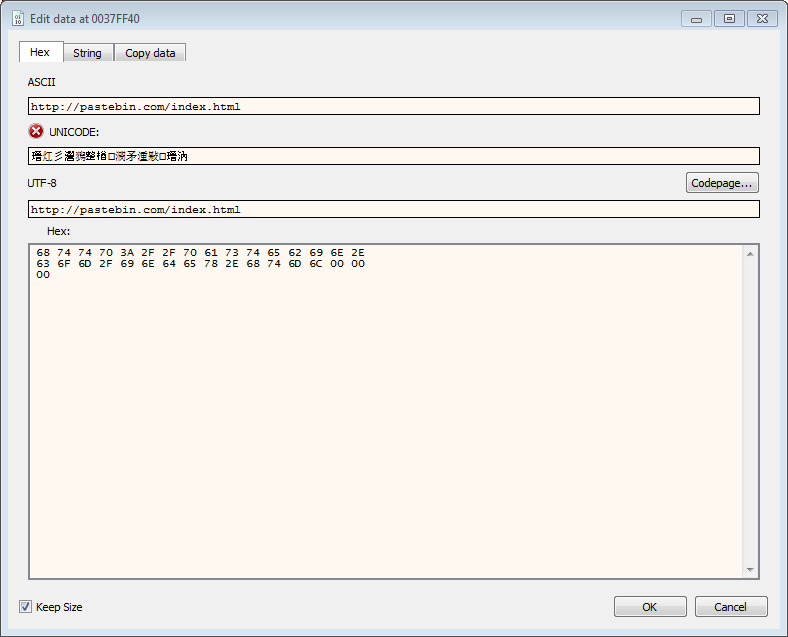
The file PNG-02-Copy.png is copied into the InetSim folder:
cp PNG-02-Copy.png /var/lib/inetsim/http/fakefiles/sample.png
The next string “output.jpg”, that the malware sample will use is obfuscated with:
rol cl,4
xor cl,1F
Which is the filename, of the payload (the PNG file) that will be written to disk. When the .png file is downloaded it will once again call the CRC32 API hashing function and resolve:
GetTempPathW
CreateDirectoryW
CreateFileW
WriteFile
It will use these API calls to create a directory in %TEMP%\cruloader” with the file “output.jpg”. This is our downloaded .PNG file it writes to disk. That it downloaded a .png file is not suspicius at all, right? Are not .png files just pictures? Well, this gets even more interesting. If we continue running the code, the string “redaolurc” shows up. What is it used for? The string “redaolurc” is obfuscated with:
rol cl,4
xor cl,9A
After that strings is deobfuscated it checks for the string “IHDR” in the memory region allocated for the downloaded .PNG file and the string “redaolurc” If we look at the data after the string “redaolurc” it seems to indicate that it contains data that has been XORed with hex “0x61” (the char “a”)
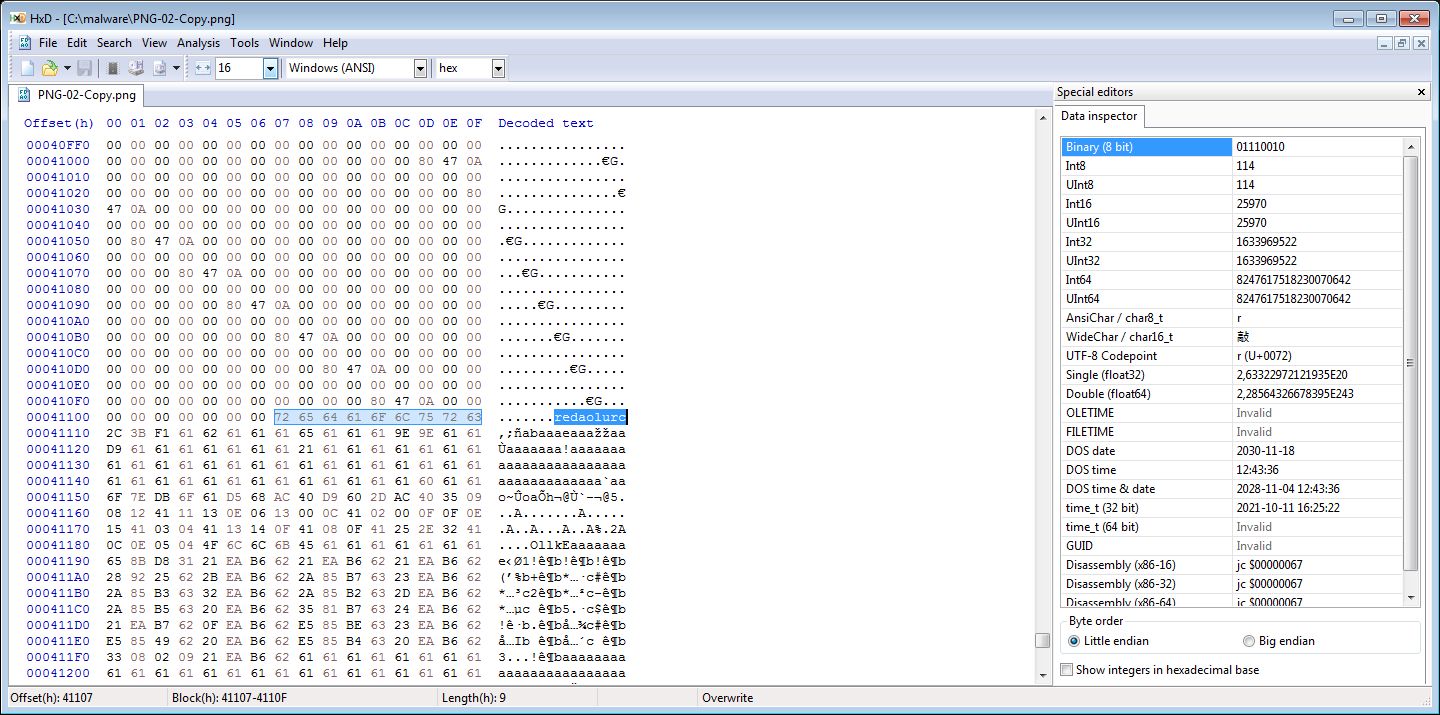
De-XORing the .png file with hex “0x61” reveals that it’s a Windows binary and that the string “redaolurc” was used as a marker, for the malware to know the offset to the encrypted payload in the .PNG file. We can trim the file by removing everything before the MZ header and then resize it with PE-Bear, so that we can analyze this final payload later. Continuing exectution, it spawns a new svchost.exe process in which it injects the payload from the decrypted .png file. The final payload contains an interesting string in form of PDB path, which we could build a YARA rule for.
"C":\Users\User\source\repos\Cruloader_Payload\Release\Cruloader_Payload.pdb"
The functionality for the final payload is to display a Messagebox:
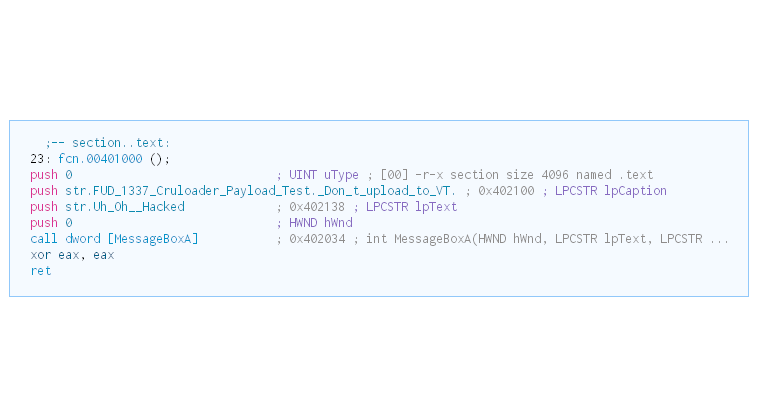
To automate parts of the extraction of the first packed layer and download of the .png payload I have created the following Python script: (Note that I am quite the beginner at Python coding, so the code may not be the best you’ve seen)